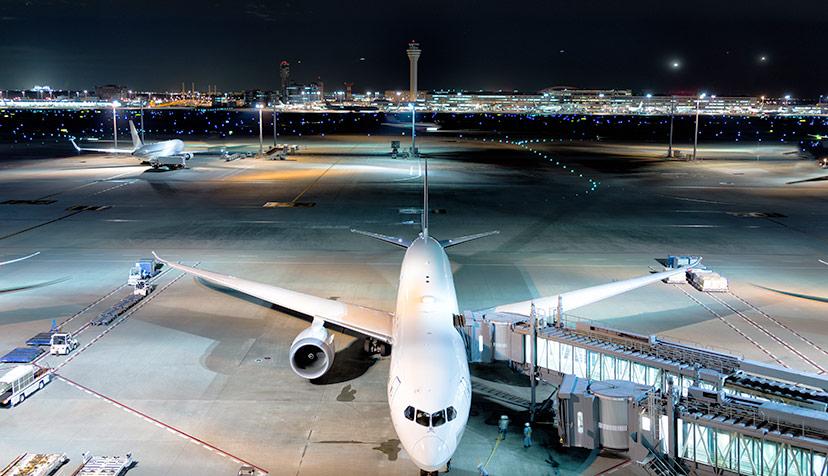How the Shutdown of Business Travel Impacts Economic Development

The Mastercard Center for Inclusive Growth
The crux: Face-to-face business travel is directly tied to economic growth, according to a recent article in the journal Nature Human Behaviour by researchers at Harvard’s Growth Lab. Without business travel, the researchers find, countries share less know-how and as a result, grow and diversify their economies less. If international business travel were to shut down completely, global GDP could shrink by double-digit percentages.
The context: As many businesses have shifted to Zoom calls and working from home, they’ve realized that employees can work independently and still be productive while remaining safe. But, one long-term consequence of this shift to virtual can be the loss of shared tacit know-how that comes from rubbing shoulders with colleagues. Tools and how-to manuals are easy to share virtually, but know-how moves very slowly from brain to brain through a long process of imitation, repetition and feedback. Just as there are no set instructions for how to ride a bike—instead someone shows us and we give it a go—some things in industry are simply impossible to codify. Business travel is an important conduit for that know-how.
Using aggregated and anonymized Mastercard data to map business travel, the researchers traced how the tacit knowledge of those travelers manifests in a country’s economy. They show a causal impact of, not just a correlation between, incoming business travel on a country’s economy.
Why It Matters: Economies grow by adding new products and services, not just producing more of the same, and a key to this diversification is know-how. Emerging markets currently see less business travel from wealthier countries, and therefore miss out on many of the benefits of exchange.
Using aggregated and anonymized Mastercard data to map business travel, the researchers traced how the tacit knowledge of those travelers manifests in a country's economy.
Takeaways from the research
- Business travel from countries specializing in a specific industry leads to growth in that industry in the destination country. When travelers from Germany share insights on automotive engineering with those in Austria, the automotive industry in Austria grows.
- The countries that dispatch their knowledge most widely are Germany, Canada, the United States, the United Kingdom, South Korea, France and Japan.
If Germany stopped business travel, global GDP could decline by an estimated 4.8 percent. The researchers’ predictions suggest that Austria would likely be most affected by the stoppage, followed by South Africa, Switzerland, Nigeria, Czechia and Turkey.
Figure 1: Impact of a Stop in Business Travel from Germany
Source: Harvard Growth Lab estimates
If the U.S. ceased all business travel, global GDP could decline by an estimated 1 percent. Canada and Mexico would likely be most affected, but so too would Haiti, Jamaica, El Salvador, Rwanda and Peru.
Figure 2: Impact of a Stop in Business Travel from the United States
Source: Harvard Growth Lab estimates
- Of the 88 countries included in the rankings, India ranks 12th and China 17th in order of importance of know-how exchange, though before COVID-19 struck they were seeing among the fastest growth in sending business travelers on the road.
- The countries that benefit the most from visitors’ know-how are Austria, Ireland, Switzerland, Denmark and Belgium.
- The greatest beneficiaries of business travel in the developing world are Panama, Uruguay, Serbia, Malaysia, South Africa and Chile, although no developing country ranks among the top 25 recipients.
- Some countries get an extra bump from business travel. These countries attract more business travelers than what would be expected given their share of the world’s population.
Figure 3: The know-how bounce: how much larger/smaller an economy is estimated to be due to its actual inflow of business travel than if it had received its fair share of business travel.
Source: Harvard Growth Lab estimates.
Note: “Fair share” means business travel is commensurate to population. If India is home to one-sixth of the world’s population, its “fair share” would be one-sixth of all business travel.
Figure 4: Economies that are estimated to be notably larger by attracting disproportionate numbers of business travelers
Source: Harvard Growth Lab estimates
Figure 5: Economies that are estimated to be smaller due to missing out on business travel.
Source: Harvard Growth Lab estimates
The last word: Not only does business travel account for one-fifth of the global travel and hospitality sectors, but as this research shows, it drives economic growth and diversification. Yet, a recent McKinsey report shows that historically business travel rebounds from crises more slowly than leisure travel. They also predict that domestic business travel will return first, which risks setting emerging markets farther behind, given that these markets are already poorly connected and risk becoming completely cut off from the world’s global body of know-how.
Check out more content from the Mastercard Center for Inclusive Growth

